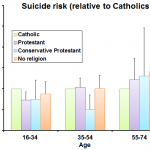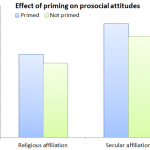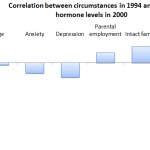A team from Stanford University Graduate School of Business has just published a nice series of studies showing that priming people with the idea of god can increase their appetite for risk.
Over at the Friendly Atheist, Rachel Ford did a good write up, leading with the headline conclusion that thinking about god actually causes people to take bigger risks. Slate had the same take, claiming that Thinking about religion makes people take risks.
Regular readers of this blog are entitled to a double take at this point! I mean, aren’t religious people less likely to take risks than the non-religious?
Well yes, gentle reader, indeed they are.
To take just a couple of recent studies, Dutch churchgoers are less likely to take financial risks than non-churchgoers. And, for a cross-cultural perspective, risk averse Taiwanese are more likely to participate in religious activities – and that goes for Buddhism, Taoism, Chinese popular cults and Yiguan Dao (which is a modern, syncretic religion), as well as Christianity.
So what gives? Well, here at Epiphenom we like to dig a little deeper. So let’s unpick it.
First off I should be clear that the Stanford team really did show that reminding people about God increases their appetite for risk.
I’m a bit sceptical about their flagship study, however. In this one, they placed adverts on a social networking site for different kinds of risky (or no risk) activities – check out the graphic below to see how they phrased their different adverts.
Now, there a real problem here. With the skydiving one, maybe the risk that they are reducing is not the fear of death but the fear that they are not living up to God’s expectations (“God knows what you are missing!”).
And with the bribery one – well, it’s well known that reminding people about god can make them better behaved (at least not in the short term). Risk aversion needn’t have anything to do with it.
But the other studies were good. Particularly one in which they gave participants the choice of looking at extremely bright colours on a computer monitor, which they were told could damage eyesight (it can’t) – in return for a slight increase in payment and decrease in test time. Participants who had receive subtle god prompts in an earlier task were likely to take on the risk.
Other studies they did suggested that these effects were down to people feeling safer with a god watching over them. So they are more willing to take a risk.
So how come, in real life, religious people are so risk averse? Well, one thing to remember is that it’s not just religion that has this effect.
People very readily turn to superstitious behaviour in order to improve their luck, as this recent study shows. And even a belief in science can substitute for religion, at a pinch.
So religion can ’cause’ people to take bigger risks. But then so can all sorts of other things, so we shouldn’t paint religion as some kind of specially perilous activity.
And that leads to the real crux of the matter. People turn to religion and superstitious behaviour when they feel tense or not really in control of events around them. There’s a whole bunch of evidence which shows that. More recently, there was evidence from Europe that experiencing war or the threat of terrorism can make people more religious.
So the reports about how religion can increase risk taking are not wrong, they’re just missing the main reason why these results are so fascinating.
In fact, what they are is yet more evidence for why many people turn to religion.
People who are anxious or afraid turn to religion to overcome their fears and help them to be bold. The Stanford studies clearly demonstrate that religion can be a real help for these people.
People who are quite bold enough don’t feel the need to ‘self-medicate’ in this way. Yes, religious beliefs might make them take even more risks – but that’s why they avoid religion!
![]() Kupor, D., Laurin, K., & Levav, J. (2015). Anticipating Divine Protection? Reminders of God Can Increase Nonmoral Risk Taking Psychological Science DOI: 10.1177/0956797614563108
Kupor, D., Laurin, K., & Levav, J. (2015). Anticipating Divine Protection? Reminders of God Can Increase Nonmoral Risk Taking Psychological Science DOI: 10.1177/0956797614563108
Hamerman, E., & Morewedge, C. (2015). Reliance on Luck: Identifying Which Achievement Goals Elicit Superstitious Behavior Personality and Social Psychology Bulletin, 41 (3), 323-335 DOI: 10.1177/0146167214565055
Noussair, C., Trautmann, S., van de Kuilen, G., & Vellekoop, N. (2013). Risk aversion and religion Journal of Risk and Uncertainty, 47 (2), 165-183 DOI: 10.1007/s11166-013-9174-8
 This article by Tom Rees was first published on Epiphenom. It is licensed under Creative Commons.
This article by Tom Rees was first published on Epiphenom. It is licensed under Creative Commons.















